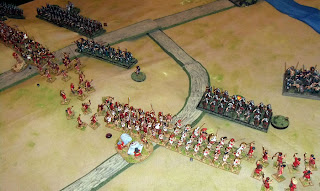The mission was a classic one, a bridgehead battle. The Romans having seized the one good bridge for miles over the fast flowing and deep Suriexes river were now aiming to take one of the passes leading out of the valley. If the Greeks could defeat them here, they would be able to defend the bridge and keep the Romans at bay from their territory.
The Greeks were confident as they had a trick up their sleeve, but the Romans were confident too. This was a rare engagement for them where they had massed artillery support within an effective range of the enemy. The Greeks were forced by the terrain to expose themselves to enemy fire on the ridges, or else surrender the passes undefended.
I was quietly surprised to see the Romans deploy to attack both passes, but he had every option to do otherwise, as the Greeks other disadvantage was the fact the Greeks had to deploy first (representing their defending the passes all night).
When the Romans finally began the attack, only one of their generals was ready to do battle; the other allowing the bathing of his courtesans to delay him at the waters edge. Still the Greek line was in disorder after the deadly fall of shot from the Roman Onagers on the Western bank of the river.
The Greeks tried to keep the second Roman division at bay, but they were no more prepared to advance than their adversaries. In time the Romans caught up with the first division, who were already preparing for their fisrt attack up the hill by sending auxilary archers in force against the Greek slingers facing them.
The Greeks were pressed and a general assault by both Roman divisions was to leave them with several phalanxes in a battered state.
However the Thracian allies arrived (on turn four) after a long diversion. After racing eight miles to the south in search of the next bridge, they returned to the battlefield after their night march; right behind the Roman artillery.
It wasn't a fix! I'd had to choose where to send my reserves on from before any deployments, and it just so happened Richard not only set up his artillery as close as possible to my entry point, but then sent their bodyguard of Auxilia off the the front line instead. The artillery to it's credit managed to turn and fire once, ineffectually, on the Thracians; but then the barbarians fell upon them and soon they were no more than firewood.
Though oblivious to this, the Romans suffered other reverses at the same time. The phalanxes wore them down and two of their cohorts crumbled in the face of a stiff and well supported Spartan line. The Roman barbarian allies displayed no stomach for the fight and left their allies in grave danger.
The Romans made three more assaults on the Southern pass, and were by the end of the day within a hairs breadth of attaining it. But unbeknownst to them the rest of the army had collapsed. The other main division of Romans had by this stage seen three cohorts destroyed, and the retreat of their auxilia had only shown the Bridge back over the river to be in enemy hands.
Then the auxilia attached to the artillery command, and all that remained of it, were hit in the flank by a tired Greek formation. Tired but with enough aggression to destroy the Romans. With that two Roman commands were broken, and the surviving division had to fall in to retreat.













Great report. Everyone has a soft spot for the Spartans!
ReplyDeletegood looking game and AAR
ReplyDeleteGreat looking game and a well written AAR.
ReplyDeleteAs always, a great report to look and an read.
ReplyDelete